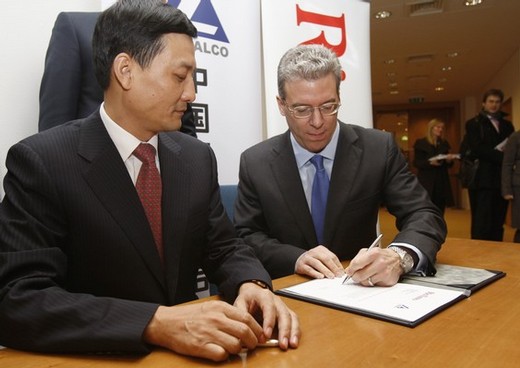How are the Chinese reacting to the news of the unhappy dissolution of this marriage of convenience? Will they accept at face value the explanation offered by Prime Minister Rudd that he wants ‘our friends in China’ to understand that the decision has been made on commercial grounds and it was not politically motivated? The Chinese reaction to the deal has important consequences for perceptions of the continued viability of Australia’s open foreign investment regime, especially in the mining sector. Or, perhaps more worryingly, could this failed deal be seen as a xenophobic reaction to Chinese investment in Australia?
The failed deal received extensive press coverage in China and the leading financial paper, Caijing Ribao, covered the abortive deal largely through the commercial circumstances surrounding the failed transaction. It also covered the potential repercussions the decision has for the current round of iron ore negotiations as a result of the joint venture agreement between two mining giants in the Pilbara region.
The report mentioned negative press coverage and hostility from opposition parties. One of China’s leading outlets, Southern Daily, was less sombre in its assessment and directly attributed the failure of the deal to political opposition in Canberra; the title provocatively suggested that the ‘East wind does not blow in Canberra’.
The paper commented that Chinalco management believed that the biggest hurdle was the Foreign Investment Review Board which had spent a considerable amount of energy and time on lobbying the government. One insider to the negotiation told the reporter during an interview that Rio executives are keenly aware of the untenable political position that the Rudd government is in and they attempt to steer the deal clear of a political minefield and resolve it on strictly commercial terms.
Xinhua news also hinted at the ‘Cold War’ mentality in the failure of the transaction and blamed the FIRB for its repeated delaying actions to win time for Rio to seek alternative options. One of China’s largest web-portals, Sohu.com, quoted a Beijing daily that was even gloomier in its reporting, commenting that political considerations had taken precedence over commercial interests in the breakdown of the Rio-Chinalco deal and Australia’s Anglo-Saxon heritage inevitably limits its trust of China. The editorial also expressed its lack of confidence in international free markets and remarked that Chinese firms could only pick up second rated assets. Most strategic resources and sophisticated technologies are still beyond Chinese reach on the open market.
As argued by Peter Drysdale in an earlier article, Australia must move fast to dispel such perceptions in China and assure our biggest customer that their investment is still welcome here. The last thing we need right now is to have names like ‘Ban-a-Buy Joyce’ and ‘Nick Xenophobe’ splashed across the Chinese newspapers.
Peter Yuan Cai is PhD candidate in Modern Chinese History & Political Economy at Adelaide University and currently Visiting Scholar at ANU.


While I have been critical to the Australian government’s handling the matters regarding to Chinese investments and some commentators and politicians fanning ignorance and hostility towards such investments, I came to realise that the Chinalco – Rio deal was probably made a bit too complex to look attractive to more people.
Some Australian commentators say it was too complex, including more 600 pages documents and involving complex transactions. In hindsight, maybe a less complex deal would have been much better.
Starting with complexity and failure was not good for confidence building on both sides. Maybe that is a lesson for all involved. Of course, how to manage issues involving the politics and public relations in Australia by Chinese investors remains as important as ever, if not more so. That is also investment, and can’t and shouldn’t be ignored.
Thanks Yuan, good to get the Chinese perception of this issue. Japan has recently signed an investment agreement with China (to grant further protections for intellectual property rights). Do you think Australia ought to make some additional effort, such as an investment agreement, to dispel Chinese uncertainities? Perhaps as a part of the FTA (still) under negotitations? Or do you think it best to let the issue quietly fade?
As a substantial investor I’m far better off with the new deal that was placed on the table. Commercial realty won the day and if Chinalco had made a better offer at the right time their offer would have won the hearts of the shareholders. They didn’t so they ran a soon forgotten second place. I am not surprised at the hype and hysteria that is being whipped up by non stakeholders raising hypothetical issues that have very little to do with the best interest of the shareholders. I’m selfish as I think the shareholders interests are paramount in this type of transaction. If you were a shareholder so would you be. Dont be fooled by the rheteric coming from the chinese, the simple fact is the chinese, japanese & koreans can’t go without the low cost-high grade products that are strategically placed geographically which will continue to be bought by them in their best interest.
Michael
I agree with you that it is now becoming clear the deal was not, for a variety of reasons, commercially acceptable to the parties principal. However, a bigger point that I have been making is that what is important is the way in which the commerce, the policy and the politics were managed has left us with a set of problems that we have to deal with.
There is, incidentally, remarkably little ‘Chinese hysteria’ over the episode so far.
Peter